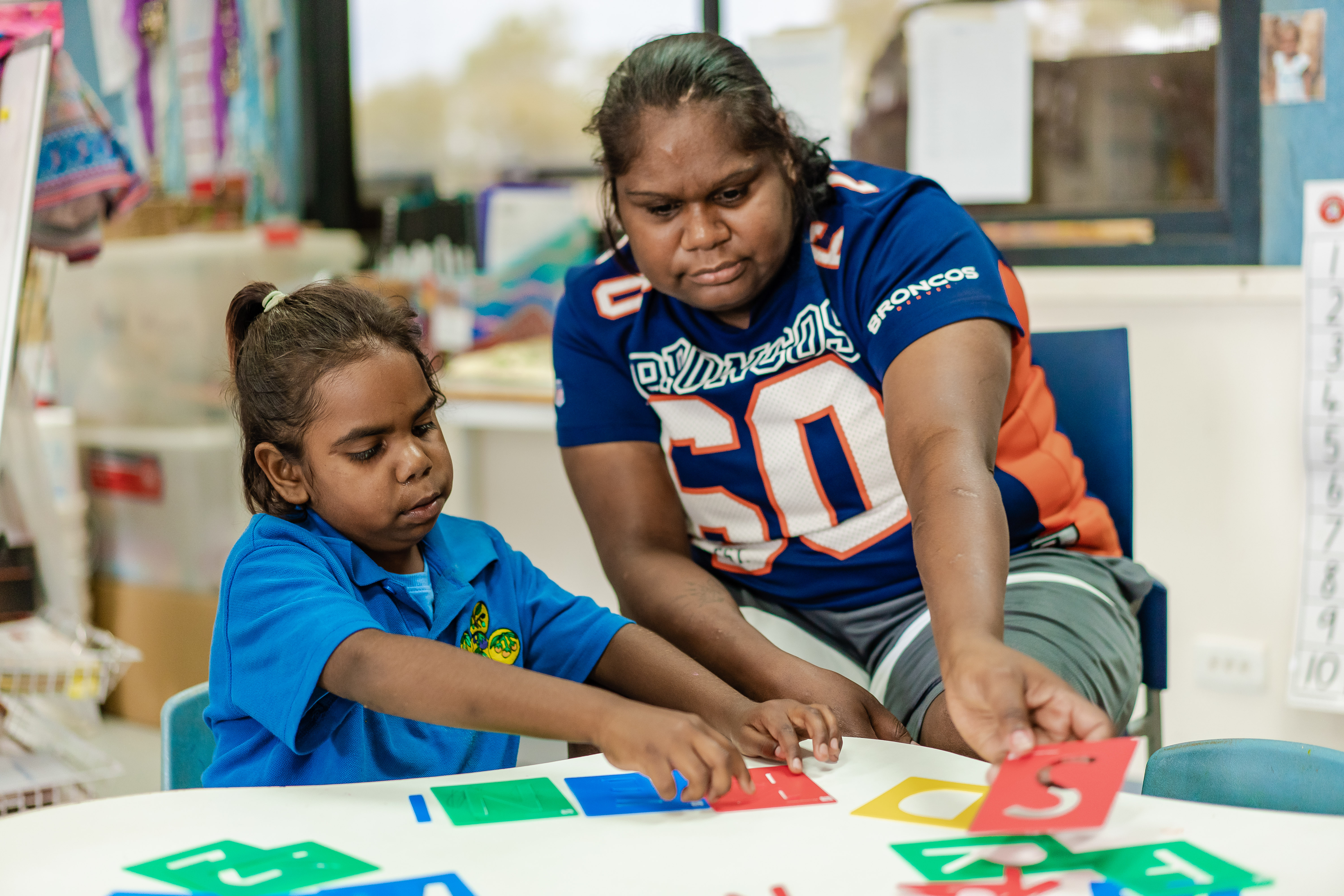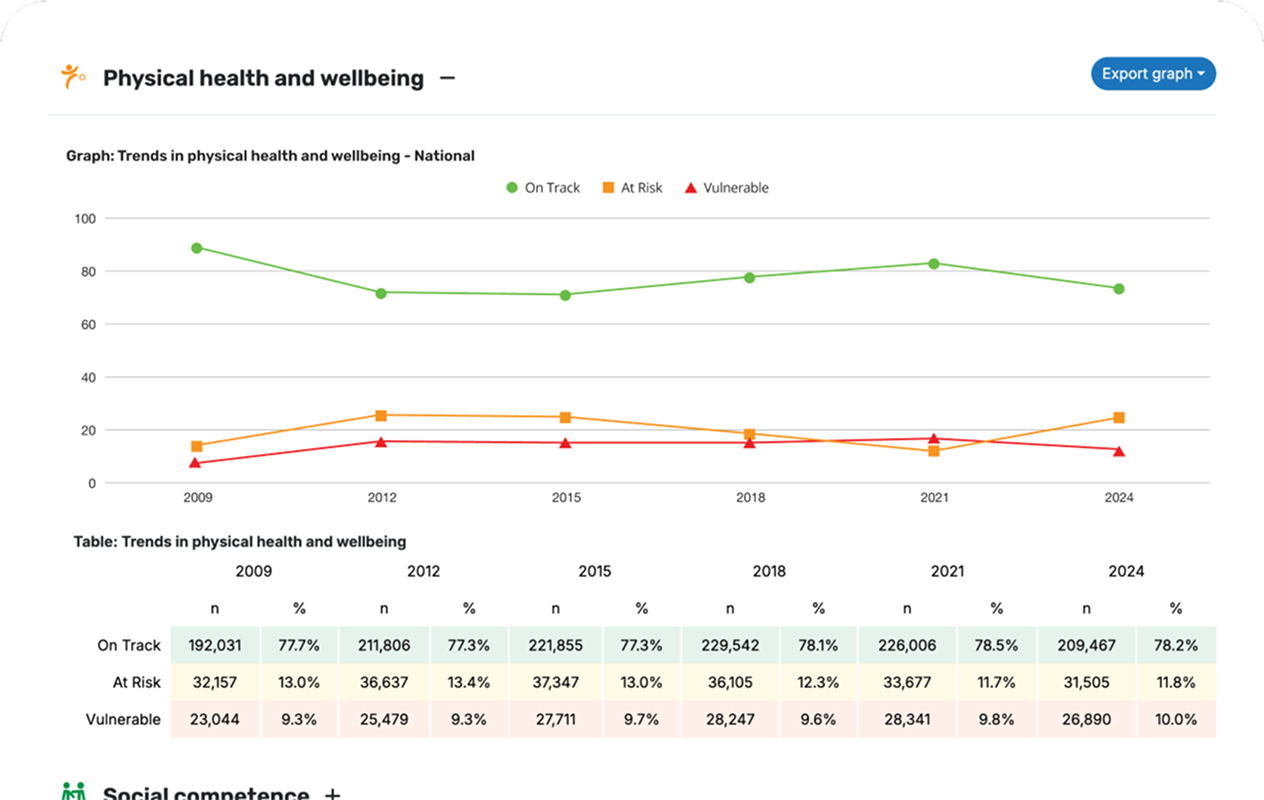
Date: January 2024
AEDC Cycle: Cycle 1 (2009), Cycle 2 (2012), Cycle 3 (2015), Cycle 4 (2018), Cycle 5 (2021)
States: ACT, NSW, NT, QLD, SA, TAS, VIC, WA
Data Linkage Project: No
Organisation: University of Melbourne
This is an ARC Discovery Project with an aim to understand the historical drivers of historical frontier violence, its legacy on current outcomes in communities where the events took place, to understand the mechanisms for the intergenerational transmission and to explore how truth-telling can help heal communities.
This project is an extension of a previously approved project with AEDC data (no. 190710B). The previous project was only for conducting preliminary analysis to test whether there was any correlation between communities where massacres took place (SA2 level) and child development indicators of Indigenous children living in communities where historical massacres occurred to establish proof-of-concept to apply for an ARC Discovery Grant for a large-scale econometric study. Based on the significant, large and consistent negative relationships between individual child development measures (across all domains) in communities exposed to historical violence uncovered in the first phase of the project, we were granted funding to extend the project.
The project is guided by an Indigenous-led steering committee to support community engagement, to ensure that the research is communicated in an impactful and culturally sensitive way and to inform how to make FWD available in a way that is consistent with Indigenous data sovereignty principles.
Date: January 2024
AEDC Cycle: Cycle 1 (2009), Cycle 2 (2012), Cycle 3 (2015), Cycle 4 (2018)
Location: VIC
Data Linkage Project: No
Organisation: Njernda Aboriginal Corporation and Victorian Department of Health
Njernda Aboriginal Corporation, an Aboriginal Community Controlled Organisation (ACCO) in Echuca, Victoria, provides a wide range of early years services starting with antenatal and maternal health through to kindergarten. An early intervention service was designed to provide intensive parenting support for mothers whose (born or unborn) children are at risk of child protection involvement in a culturally competent, sensitive and respectful way. The service works with a maximum of 18 mothers at any time.
The existing evaluations of these initiatives highlight the value of culture and the difference ACCOs can make to the lives of children and families in the short term. Njernda wants to now examine whether these new approaches have a longer-term impact on the children’s lives. This project will be examining the impact on health, development, education, contact with the child protection system and social wellbeing. The learnings will be shared across the Loddon Mallee Aboriginal Reference Group (LMARG) membership of four Aboriginal Community Controlled Organisations, including Njernda, at regular intervals so that they can continue to shape and revise their service delivery.
Date: January 2024
AEDC Cycle: Cycle 1 (2009), Cycle 2 (2012), Cycle 3 (2015), Cycle 4 (2018)
Location: ACT, NSW, NT, QLD, SA, TAS, VIC, WA
Data Linkage Project: No
Organisation: Department of Communities and Justice
The Secretary of the NSW Department of Communities and Justice has requested data from the AECD on Aboriginal and non-Aboriginal children in NSW over time compared to Aboriginal and non-Aboriginal children in the rest of Australia. This is to inform planning work by the Department to target investment in effective interventions to improve outcomes for vulnerable Aboriginal children and families in NSW.
Date: January 2024
AEDC Cycle: Cycle 1 (2009), Cycle 2 (2012), Cycle 3 (2015), Cycle 4 (2018)
Location: ACT, NSW, NT, QLD, SA, TAS, VIC, WA
Data Linkage Project: No
Theme(s): Aboriginal and Torres Strait Islander children
Organisation: National Drug and Alcohol Research Centre, University of New South Wales
The aim of the project is to (a) describe the proximal and distal factors responsible for Indigenous Over-Representation in Prison and (b) discuss the challenges and opportunities for reducing that over-representation.
Date: January 2024
AEDC Cycle: Cycle 1 (2009), Cycle 2 (2012), Cycle 3 (2015), Cycle 4 (2018)
States: ACT, NSW, NT, QLD, SA, TAS, VIC, WA
Data Linkage Project: No
Organisation: Australian Government Department of Education
The project involves developing a dashboard telling the ‘cradle to grave’ story for very remote, remote and non-remote Indigenous and non-Indigenous students.
Date: January 2024
AEDC Cycle: Cycle 4 (2018)
States: NSW
Data Linkage Project: No
Organisation: NSW Ministry of Health
Maari Ma (an Aboriginal Community Controlled Organisation covering Far West NSW) has produced two five-year reports on child health and wellbeing outcomes (one in 2009 and again in 2014). The next five-year report will include data for 2015 and 2018, which will include data on children considered developmentally vulnerable and children considered 'at risk' by AEDC domains. Maari Ma previously reported this data for the years 2009 and 2012 for Aboriginal children in the Maari Ma region, all children in the Maari Ma region, Aboriginal children in NSW and all children in NSW. The Maari Ma region includes five LGAs: Balranald, Broken Hill, Central Darling, Wentworth and Unincorporated NSW.
Date: January 2017
AEDC Cycle: Cycle 2 (2012), Cycle 3 (2015)
States: QLD
Data Linkage Project: Yes
Organisation: Centre for Prevention of Chronic Disease, Cairns Institute, James Cook University
This research investigates the issue of anaemia among Indigenous mothers and their children in Far North Queensland. It is recognised that anaemia has negative outcomes on health and wellbeing of young children as well as long-term impacts on educational achievement of children.
Date: May 2015
AEDC Cycle: Cycle 1 (2009), Cycle 2 (2012)
States: SA
Data Linkage Project: No
Organisation: Wardiparingga Aboriginal Research Unit, South Australian Health and Medical Research Institute (SAHMRI)
This research will report disparities in health and social determinants between and within communities of Aboriginal and non-Aboriginal people in South Australia (SA) at a local area level. From baseline reporting, the project will aim to evaluate change over time in the gap in health status and life expectancy of Aboriginal people compared to non-Aboriginal people in SA. The research is government by an Aboriginal Advisory group and supported by a Technical Panel. Developing capacity of and opportunities for Aboriginal people in data acquisition, management, analysis, interpretation and reporting is a core deliverable of the research. At a local level this project will aim to empower local Aboriginal communities within each of the 19 geographical areas through the provision of relevant, local information about their health and wellbeing.
Date: May 2015
AEDC Cycle: Cycle 1 (2009), Cycle 2 (2012)
States: ACT, NSW, NT, QLD, SA, TAS, VIC, WA
Data Linkage Project: Yes
Organisation: University of Melbourne
Agreement making is widely accepted as the preferred method for resolving issues of land rights and native title: however, there is a lack of systematic research focusing on accessing the extent of community benefit associated with these agreements. Consequently, there is little to inform Indigenous communities and mining companies who are negotiating agreements on how to structure and manage them in a way that optimises community social and health outcomes. The purpose of this research is to create an initial framework for objectively evaluating the social and health impacts of agreement making in the field of resource extraction.
Date: May 2015
AEDC Cycle: Cycle 1 (2009), Cycle 2 (2012)
States: WA
Data Linkage Project: No
Organisation: University of Western Australia and Telethon Institute for Kids
This project aims to address some important gaps in the evidence base in the area of Aboriginal mental health, with a focus on the perinatal period. It will examine the type, scale and timing of mental health problems in Aboriginal children and their parents (and how these have changed over time) and provide insights into the causal pathways between the mental health problems of parents and the development of Aboriginal children in the early lifecourse.
Date: March 2015
AEDC Cycle: Cycle 1 (2009), Cycle 2 (2012)
States: NSW
Data Linkage Project: Yes
Organisation: University of New South Wales
This study uses linked population-level health, community services, welfare and education data, from a child’s birth to school age, to determine factors that predict positive early childhood development outcomes in Aboriginal and non-Aboriginal children in New South Wales (NSW). The study also investigates whether early childhood development outcomes in Aboriginal and non-Aboriginal children vary by neighbourhood, and identify what neighbourhood characteristics are important for ‘seeding success’. Additionally, it will assess the impact of two early childhood programs/services rolled out in NSW on early development outcomes in Aboriginal children. This study demonstrates how linked, whole-of-population data can be analysed to evaluate the impact of policies and services, better target early childhood programs and services, and promote positive early childhood development.
Date: June 2014
AEDC Cycle: Cycle 2 (2012)
States: ACT, NSW, NT, QLD, SA, TAS, VIC, WA
Data Linkage Project: No
Organisation: Australian Productivity Commission
The Overcoming Indigenous Disadvantage report measures the wellbeing of Australia's Indigenous peoples. The report provides information about outcomes across a range of strategic areas such as early child development, education and training, healthy lives, economic participation, home environment, and safe and supportive communities. The report examines whether policies and programs are achieving positive outcomes for Indigenous Australians.
Date: June 2014
AEDC Cycle: Cycle 1 (2009)
States: NSW
Data Linkage Project: No
Theme(s): Aboriginal and Torres Strait Islander children, Equity and socio-economic disadvantage
Organisation: University of Western Sydney
This research uses linked data to improve service provision for Aboriginal children by considering the number and percent of Aboriginal children in New South Wales who scored as developmentally "on track" and "at risk" on each AEDI domain.
Community Data Explorer
Navigate the AEDC Community Data Explorer and understand the data.
